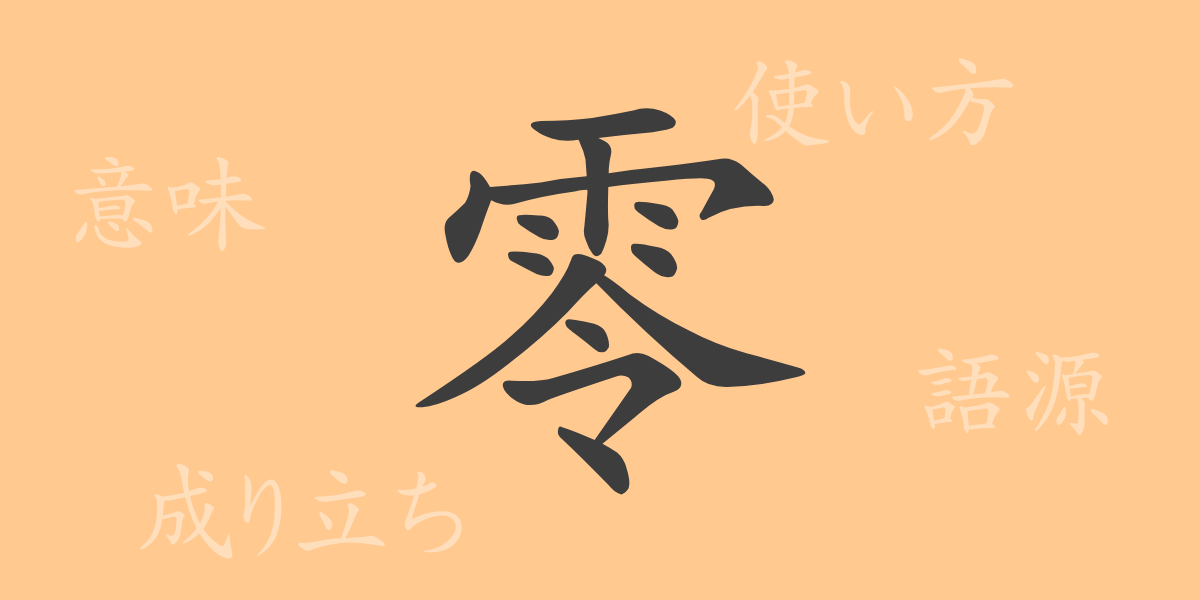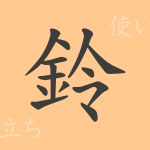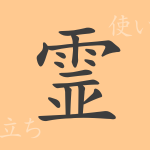Language evolves with culture and is deeply rooted in our daily lives. Each of Japan’s 常用漢字(じょうようかんじ, Joyo Kanji) has its own history, imbued with emotions and philosophy. “零(れい, Rei)” is one such kanji, possessing a rich meaning that belies its simple form. This article delves into the origins, meanings, usage, and role of “零(れい, Rei)” in Japanese culture.
Origins of 零(れい, Rei)
The kanji “零(れい, Rei)” can trace its origins back to ancient China. It is believed to have been formed by combining “雨(あめ, Ame)” which represents rain, and “令(れい, Rei)” which signifies dripping water. From this combination, it came to mean “rain falling and water dripping,” thus conveying the sense of “dripping” or “falling.” Over time, it also acquired the meanings of “disappearing” or “lacking,” and in modern times, it is widely used to mean “zero” or “nothing.”
Meaning and Usage of 零(れい, Rei)
The kanji “零(れい, Rei)” is primarily used to indicate a state of no quantity, that is, “zero.” It is also used to describe situations where something is lacking or incomplete. In fields such as economics and mathematics, the concept of “零(れい, Rei)” is indispensable for precise calculations and records. In everyday language, it appears in expressions like “零細企業(れいさいきぎょう, Reisai Kigyo),” which refers to small-scale businesses.
Reading, Stroke Count, and Radical of 零(れい, Rei)
The kanji “零(れい, Rei)” also reflects a part of Japanese linguistic culture through its readings and structure.
- Reading: In 音読み(おんよみ, Onyomi), it is read as “レイ(れい, Rei),” and in 訓読み(くんよみ, Kunyomi), it is read as “こぼ.す(こぼす, Kobosu)” and “こぼ.れる(こぼれる, Koboreru).”
- Stroke Count: The kanji “零(れい, Rei)” has 13 strokes.
- Radical: The radical of the kanji “零(れい, Rei)” is “雨(あめ, Ame),” which is used to classify kanji related to weather.
Idioms, Proverbs, and Phrases Using 零(れい, Rei)
Japanese language features many idioms, proverbs, and phrases that include “零(れい, Rei).” These reflect the deep meanings of the word and the spiritual culture of the Japanese people.
- 零細企業(れいさいきぎょう, Reisai Kigyo): Refers to very small-scale businesses.
- 零点(れいてん, Reiten): Means zero points, indicating the lowest score in tests or competitions.
- 零時(れいじ, Reiji): Refers to the starting point of time, that is, midnight (0:00).
- 零落(れいらく, Reiraku): Means falling into ruin or decline.
- 一攫千金を夢見るも零細に甘んずる(いっかくせんきんをゆめみるもれいさいにあまんずる, Ikkaku Senkin wo Yumemiru mo Reisai ni Amanzuru): A proverb depicting the state of dreaming of great success but being content with a small business in reality.
Summary of 零(れい, Rei)
The kanji “零(れい, Rei)” transcends the mere number zero, carrying a rich history and cultural background. Its usage spans from mathematics and economics to everyday conversation, closely intertwined with Japanese life. “零(れい, Rei)” also represents things that are lacking or incomplete, and by extension, can symbolize new beginnings and possibilities. The multifaceted meanings of this single kanji highlight the depth of the Japanese language and its linguistic charm.

























